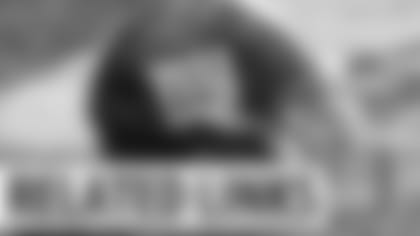**
Q: Let's start with the basics – where did you grow up, what did your parents do and do you have siblings? **
Pugh: "I grew up in the suburbs of Philadelphia, in Holland, which is in Bucks County just north of the city. It's a blue-collar town. My stepdad was the superintendent for Skanska, a construction company. My mom's a sixth grade teacher. My real father passed away when I was 13. My parents had gotten divorced; my mom remarried, so my stepdad is kind of like my father, my father figure. I have two older brothers. My oldest brother Shaun has three little kids, so I've got Jack, Lauren, Owen. They're a blast. Every time I'm home I'm hanging out with them. My second-oldest brother, Michael, just got back from Iraq. He's in the Air Force and he's been in since he was 18 years old. Those are both my stepbrothers My sister, my real sister, Jenna, graduated from Temple last year and just got a job with the Children's Hospital of Philadelphia doing their fundraising and charity events. That's the immediate family. I've got my seven best friends that I grew up with and all have an '8' tattooed on us. Three of them live with me right now. Those were my best friends growing up and they all work in the city now."
Q: It sounds like you're close to your stepbrothers.
Pugh: "Yes, real close. I talk to them all the time. I had lived with them since I was five years old, so basically I don't know the difference."
Q: Your parents…
Pugh: "Got divorced when I was very young. My dad moved away, he was living in Texas, North Carolina, so every summer I used to go out and live with him for a few months. It was still good, I had a good relationship with my father."
Q: Was he sick?
Pugh: "No, he had a heart attack at 46. He was down in North Carolina. It was crazy. I was actually sitting in class and my stepdad came and got me and let me know. It was sudden."
Q: Your mom was a teacher so I imagine education was stressed in your house?
Pugh: "That was the biggest thing with her. Probably the best example of that was when I was at Syracuse and I had the grade of a first-rounder, I could go high in the draft and I was only a junior. My mom said, 'If you don't get your degree then you're not declaring for the NFL.' She said, 'I don't care what's waiting for you, no one can take your degree away from you.' I took five classes that summer going into my last year at Syracuse, graduated early and was able to come out. That's probably the prime example of having a teacher as a mother moment."
Q: When you were young, were you prohibited from playing sports until you did your homework?
Pugh: "She would always get on me about doing those types of things, but I was always outside doing something. Four boys lived next door to me, I had my two older brothers, three boys lived down the street, so it was all boys. I felt bad for my sister, because she had nobody. We were always out doing something. She loved for me to be outside and getting off the Nintendo or whatever was popular at that time."
Q: What was your favorite sport then?
Pugh: "I was into ice hockey growing up. My oldest brother played ice hockey. My stepdad coached ice hockey, so it was hockey for me growing up. I thought I was going to be the next Wayne Gretzky, I guess. "I was a forward, but I got too big. I grew out of my older brother's equipment and eventually it was. 'Do you want to try football for a year?' I was in the seventh or eighth grade, middle school football. I had always been big, I had always done well in most sports, so I said, 'I'll try this for a year and put hockey on hold.' I never looked back from that point. It ended up being a good decision for me."
Q: Did they immediately put you on the line?
Pugh: "I was a right guard right away. I played a little middle linebacker. When I was playing defense, that was my claim to fame."
**
Q: You earned a lot of accolades in high school. Did you play any other sports? **
Pugh: "Strictly football. I played basketball my senior year. They always begged me to wrestle. I was never into wrestling, that wasn't for me. The wrestlers always had to cut weight and I would see how miserable those guys were and I was like, 'You know what, I'm not doing that.' I played football throughout and basketball my senior year. I went through all the offseason training with the basketball team, made the varsity team and then got hurt the last game of football. My mom and my stepdad said, 'You've got a scholarship. Let's make sure we don't mess anything up.' So I had to rehab and never officially played basketball."
Q: Did you play on good teams at Council Rock South High School?
Pugh: "We never went to the playoffs while I was there. And we had a lot of talent. I thought the best team I was a part of was my junior year. We had some guys that I think could have played Division 1 football. We just didn't have that chemistry. We started out slow, ended up winning five in a row at the end and just missed the playoffs. My senior year we were 6-3, all we had to do was win against our archrival in the last game of the season. Missed two field goals in the last four minutes, ended up not making the playoffs. So I never got to taste the playoffs while I was at Council Rock."
Q: Did you play any defense in high school?
Pugh: "Defensive end. I had a pick-six. You can find that on YouTube. It's the only touchdown I ever scored."
Q: Were you a fan of Philadelphia's pro sports teams, including the Eagles?
Pugh: "Philly everything. I went to as many games as I could get to. My one best friend has Eagles season tickets, so whenever I could go, I went."
Q: When did college recruiters begin to show interest?
Pugh: "My junior year they started coming in. We never had any Division 1 recruits from my high school, so coach, Vince Bedesem and me were kind of figuring it out for the first time - what to do with recruiting, how to make a highlight tape. Syracuse was my first offer. I wanted to another offer, because Syracuse was terrible at the time. They had a two-win season with Greg Robinson. I thought, 'Everyone is going to come offer me scholarships, Syracuse is already in. I'll see how the summer goes and see what happens.' No other school came in and talked to me. I mean, Penn State came in. All of the schools around the area came to talk to me, but no one offered. So going into my senior year I said, 'Let's just knot this up now. I don't want to go anywhere else.' I commit to Syracuse, I love the facility. Regardless of what their record was, Greg Robinson was a good recruiter. I got to try on his Super Bowl ring (Robinson was the Denver Broncos' defensive coordinator when they won Super Bowls XXXII and XXXIII). I committed and he got fired (after the 2008 season). Doug Marrone came in and rescinded every scholarship that Greg Robinson had sent out. I think there were 12 commits already in my recruiting class. He went to all of those kids personally and said, 'You're not the type of player that's going to fit in my system. You can still come here, I'll still honor you committing to us before I got the coaching job, but you're not going to play.' Every kid was gone except me, Andy Phillips and Alec Lemon. We were the only three left."
Q: You weren't deterred by that?
Pugh: "He told me that I was his type of guy and he liked me. So I stayed and it ended up being the best thing that ever happened to me. I had him, coach (Greg) Adkins was my offensive line coach. If I could give any advice to a young offensive lineman it was go to a school where the head coach is an offensive lineman, because they focus on that and he turned me into the player I am."
Q: With all that going on, no other school recruited you?
Pugh: "Villanova came in late. Boston College came in the last weekend and I always wanted to go to Boston College. The week before signing day they came to me and said, 'We had a D-lineman go to another school,' I guess he was an All-America. I was only a two-star (recruit). They came in and said, 'We need to know if we schedule this visit, if you're going to commit.' I called my brother right away we both wanted me to go to Boston College. I was like, 'Dude, Boston College is offering me. We've got to go up there this weekend.' I called my stepdad and he said, 'You're not going to Boston College. You're going to Syracuse. You're a week from signing day, the coaches were just at our house having dinner. You're going to Syracuse.' I ended up going to Syracuse. That was the best advice he game me through the whole process. He made sure I stuck with the team that stuck with me."
Q: You were a redshirt your first year at Syracuse.
Pugh: "I don't think I was ready to play. I wasn't the biggest weightlifter until I got to Syracuse. My senior year in high school we brought in a strength coach. His name is John Franco and he's the one who first got me into lifting. He said, 'You have to lift, because right now you're the biggest kid, but once you get there they're all your size. Strength and conditioning is going to be the factor.' When I got to Syracuse, Will Hicks was the strength coach there. Hal Luther was the assistant and they got all over me, so I was in there every day lifting, building that foundation that's gotten me to where I'm at now."
Q: Did you quickly notice a difference?
Pugh: "Oh yeah. During that year I dropped bad weight, started putting on good weight and then I started going up from there. I was able to see it in my play toward the end of the year. On scout team I was handling guys that were fourth or fifth-year seniors."
Q: Did the coaches put you at left tackle at the beginning of training camp the following year?
Pugh: "I started at left tackle on scout team toward the last couple of weeks and they saw how well I was doing there. I went into spring ball as the starting left tackle."
Q: The 2010, the first year you played, was an important turnaround for Syracuse.
Pugh: "That was the year put our stamp on the program, like, 'These are the guys we're going to battle with.' In 2009, we had Greg Paulus (a former Duke point guard who played quarterback for Syracuse) and you weren't really sure what was going to happen. Those guys fought hard. It was tough changing coaches. Marrone didn't want any of those guys on the team. He wanted his own guys, he wanted to do it his way. I think 30 or 40-something guys quit the team. We were limited in numbers. That 2010 team, that's a special team to me. The first time we beat South Florida, in 2010, I've never seen a team celebrate after a win like we celebrated after that game. That was a turning point. We said, 'We can beat these teams.' That was something I'll never forget, the way we celebrated after that win. And the coaches were celebrating, everyone. It was like all of that hard work, we knew it was starting to pay off. "We went to our first bowl game (beating Kansas State in the Pinstripe Bowl) and I that started to bring Syracuse football back to where it should have been. I didn't know if I was good or not at that point. I didn't know what made you a good player. I just figured don't get beat and it'll be a good time. At the end of that year I got All-Big East honors and guys on my team starting telling me, 'You're going to be one hell of a player.' So that's when I started to think about it the NFL."
Q: Is it safe to say you weren't as happy in 2011?
Pugh: "We beat West Virginia, which ranked in the top 10. We flew to Louisville, got our butts kicked and never won another game after that. That was disappointing. The biggest regret I have is not winning one of those games. You look back and you really wish you could have had those games. As a junior, I see the guys ahead of me, these seniors, it's their last chance at it and I was thinking, 'That's not going to happen next year.' That's where the players are (saying), 'Come on young guys, we need you to pick it up.' You don't realize how quickly you become a senior you need those young guys ot help you win right now. I remember, we were turning the ball over, guys were doing things off the field they shouldn't be doing and that led to it. If you don't go all in and commit you're not going to win games."
Q: When did you hurt your shoulder?
Pugh: "Spring ball after my junior year. After my junior year I saw three guys I played against get drafted in the first round. Bruce Irvin, Seattle, was the highest one drafted. Chandler Jones, who I played against every day, went to New England. My whole goal was, 'You make that tackle look bad for me and I'll make that defensive end look bad for you.' And then Nick Perry from USC got drafted that year. I thought, 'Three first-rounders?' The West Virginia kid (Irvin) hasn't gotten past me in three years and the kid from USC didn't do anything. After that USC game, that's when all the agents started calling me. I knew I was good and then agents were calling me and wanting to represent me my junior year. I thought, 'Hey, we may have something going on here.'"
**
Check out photos of OT Justin Pugh from the 2014 season

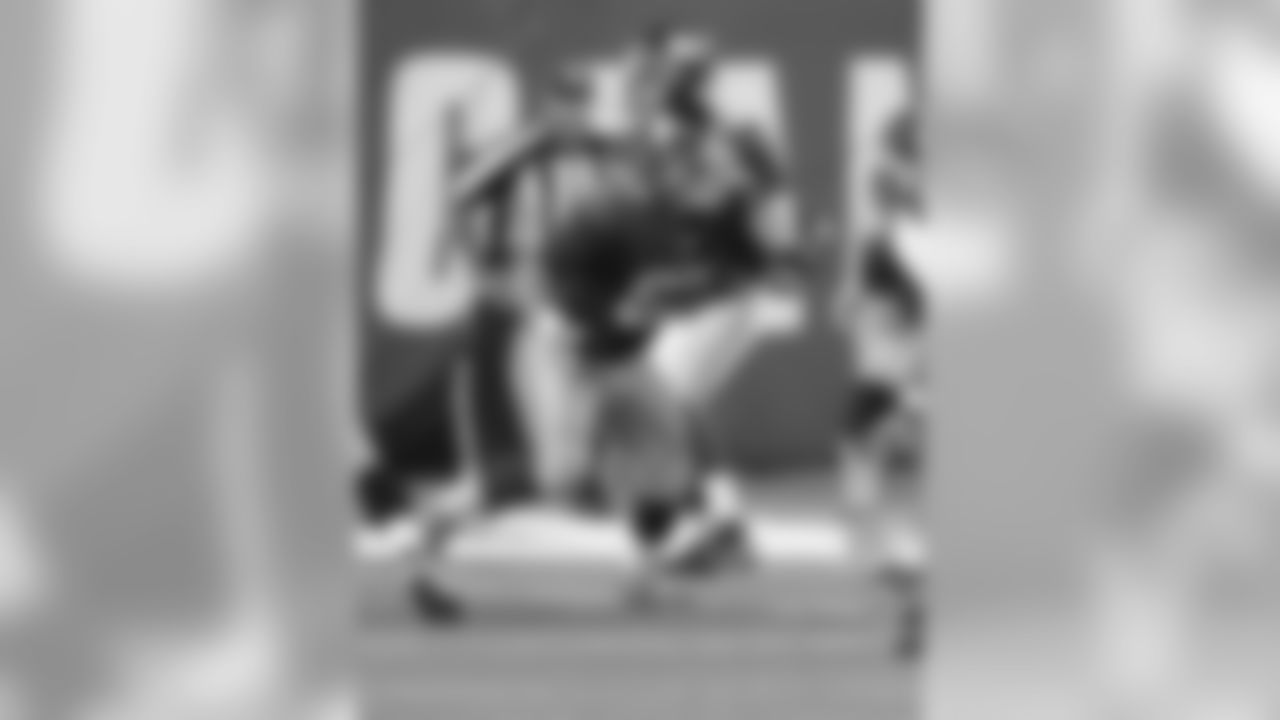
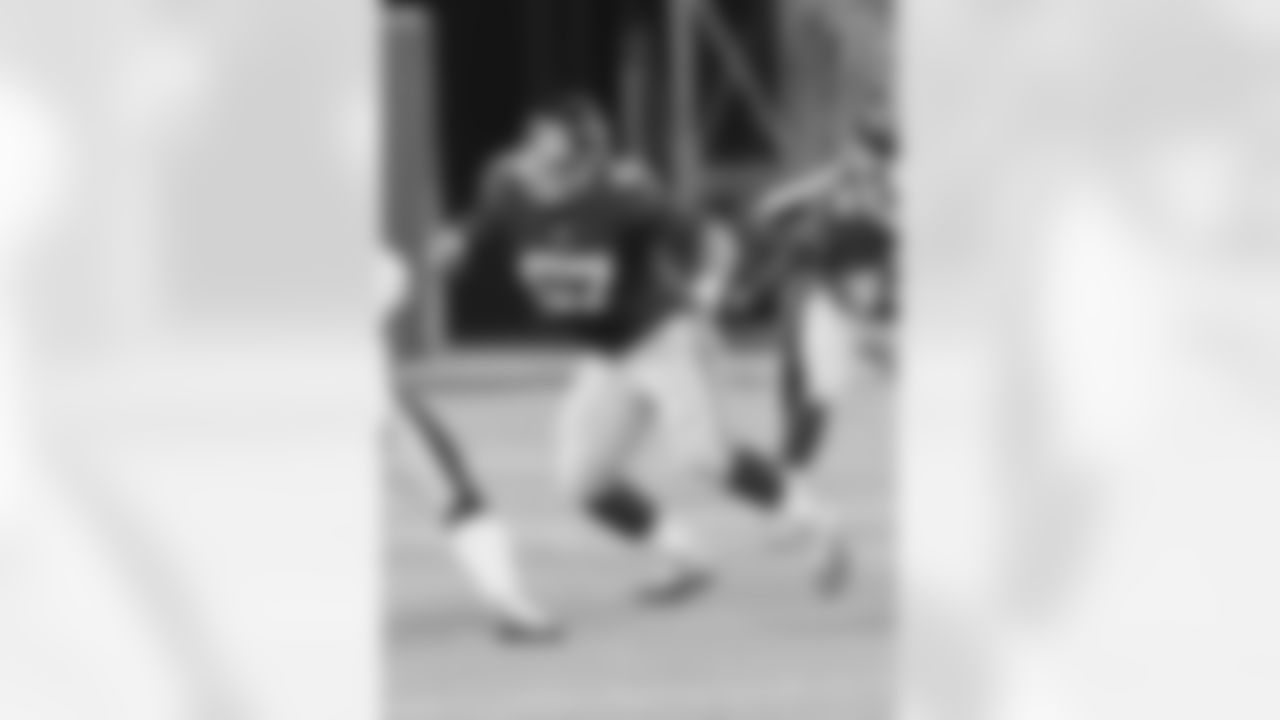
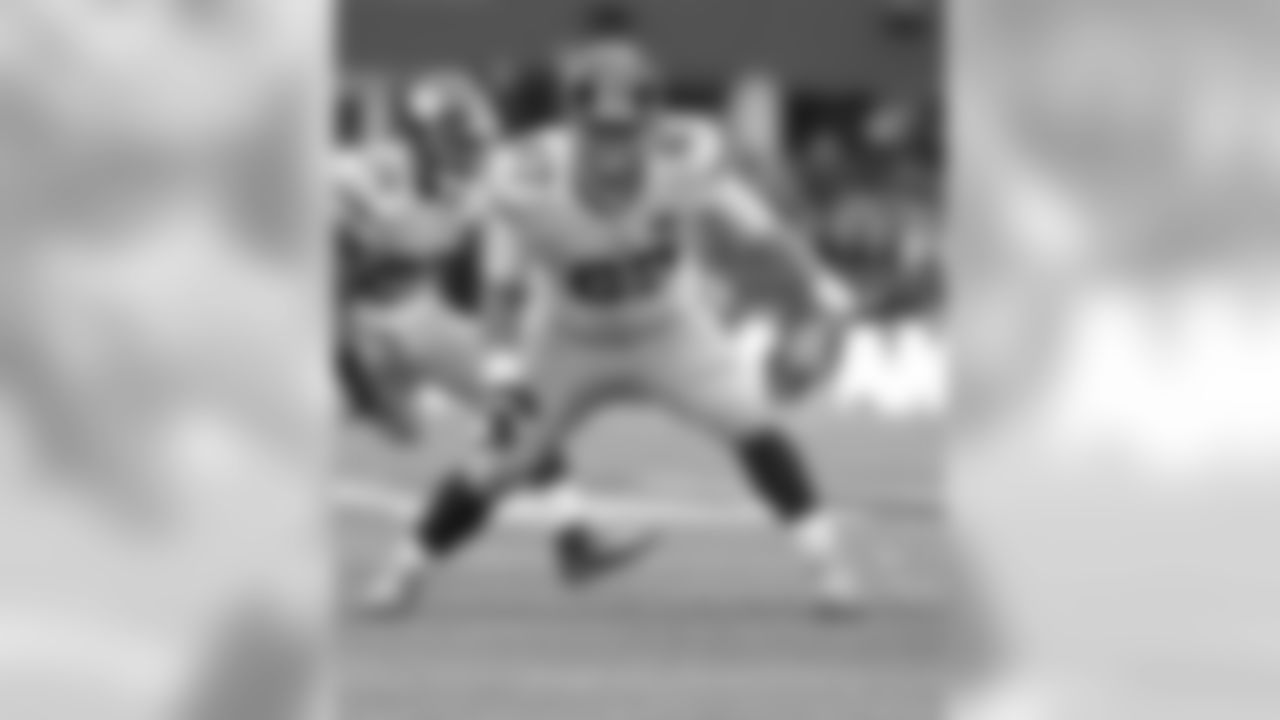
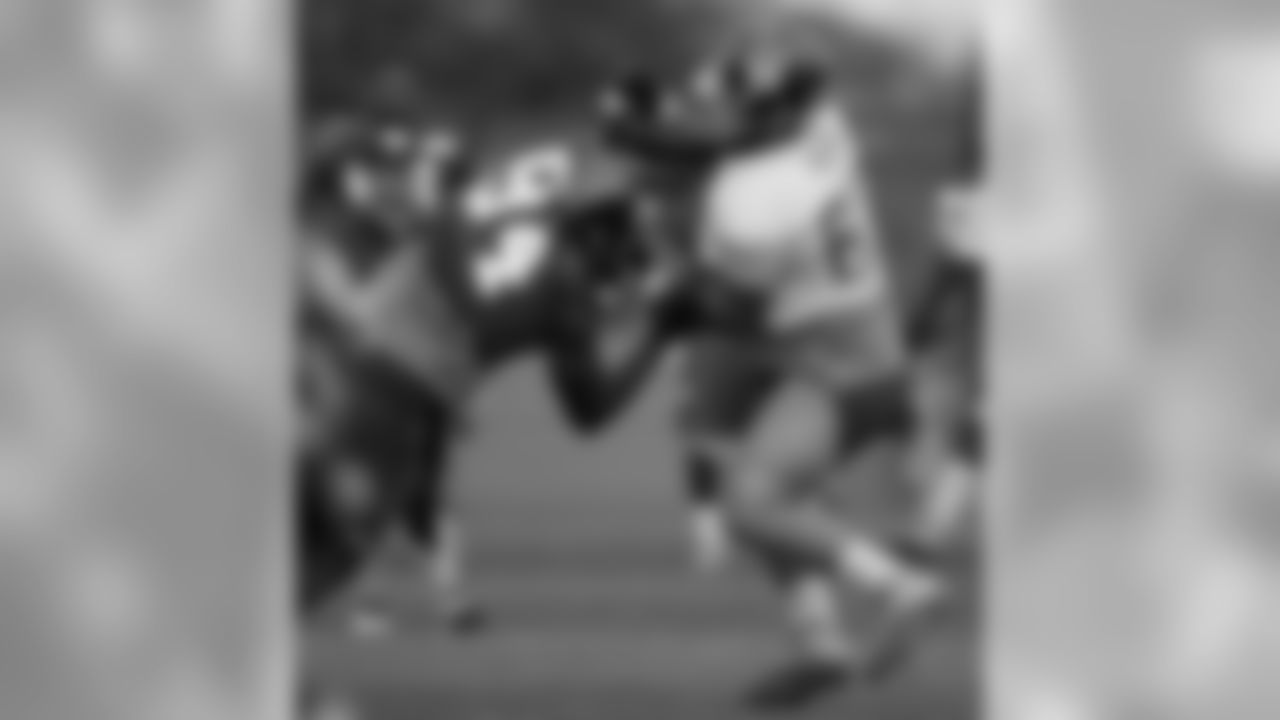

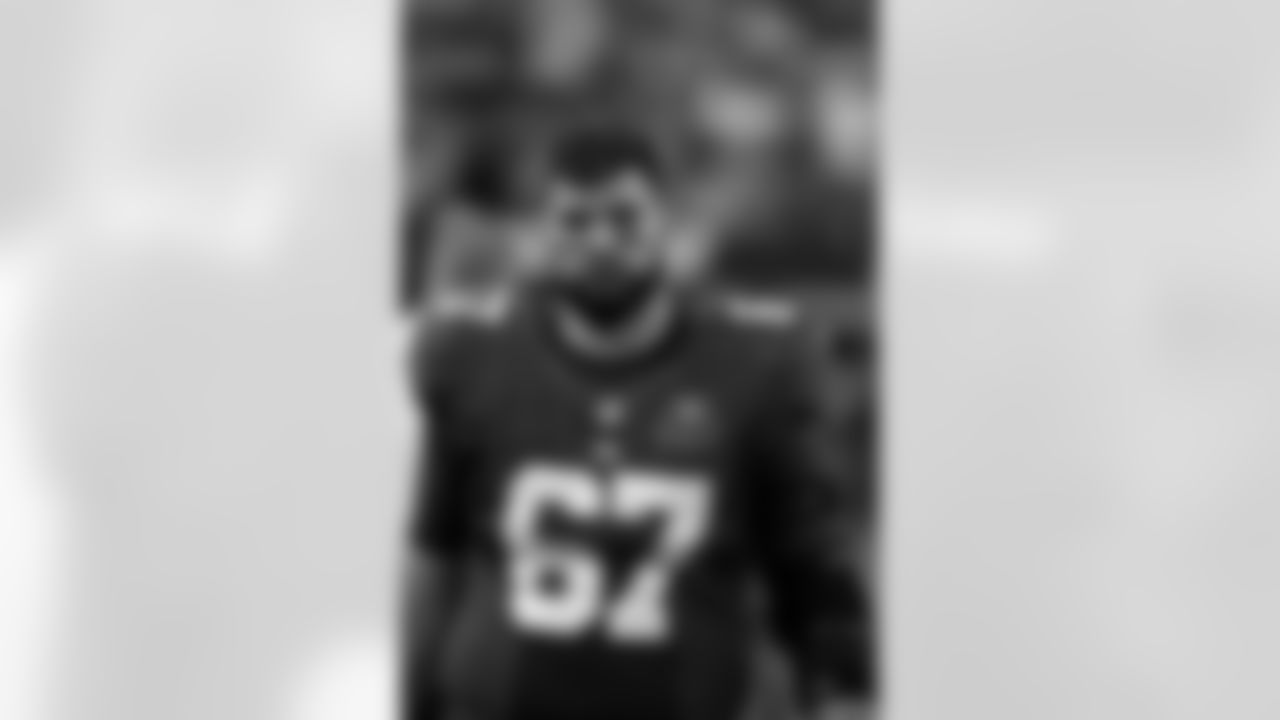
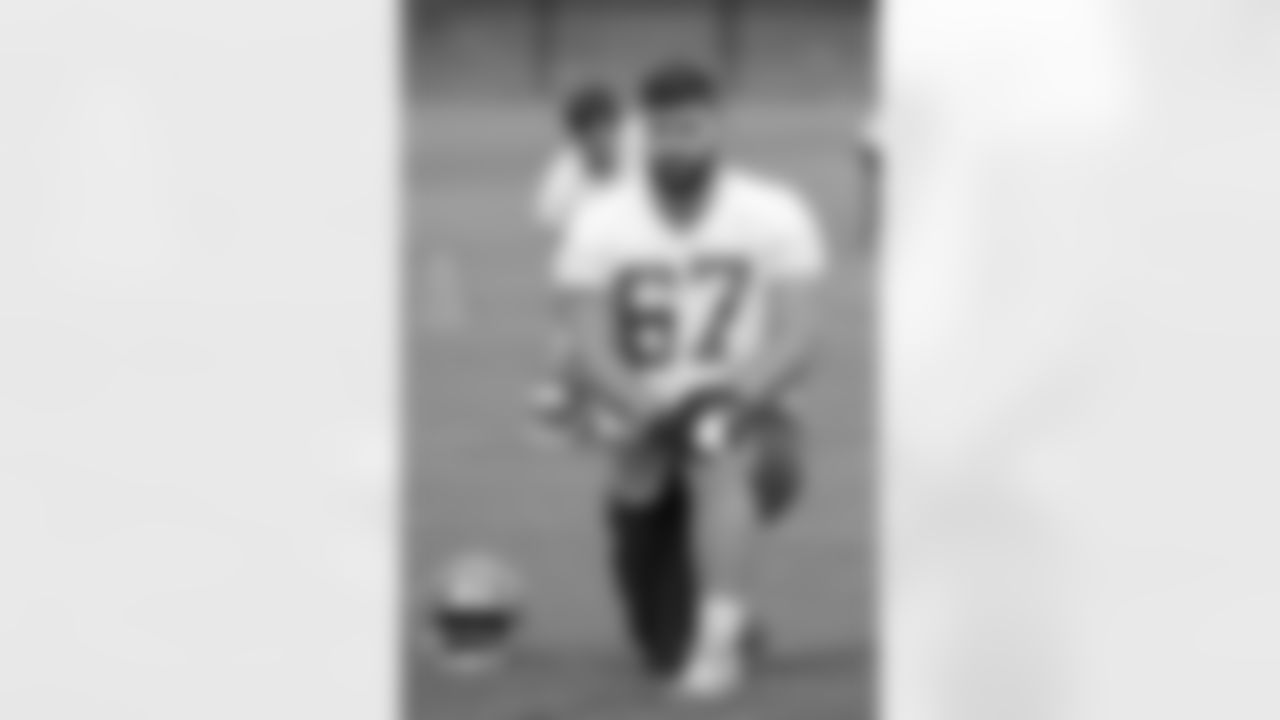
Q: You had shoulder surgery and missed the first four games of the 2012 season. **
Pugh: "I went down to Dr. (James) Andrews, got the surgery and was out the first four weeks. That was the first time I was ever injured at Syracuse."
Q: How did you deal with that?
Pugh: "It was tough. I didn't want to sit out. We lost three of the four games. I felt if I was playing we would have beaten Minnesota. We were in it against USC, I thought we would have had a chance against USC, but it's the way it is."
Q: Did you go into that year thinking it was going to be your last year?
Pugh: "Yes. That's the summer I took five classes. I wanted to be able to do it if I had the year I thought I was going to have. The way that the draft's set up now, you want to get out as soon as possible, because there are no big rookie contracts. They're not as big as they were before, so ideally you want to get to that second contract faster. I think that's why you're going to see more and more underclassmen declaring to come out early. And I got my grades back (from NFL personnel) and they said I had a first through third-round grade."
Q: Were you particularly proud to get a degree in finance early?
Pugh: "It's something that I'm definitely proud of. I knew that if I finished those classes that I set myself up to accomplish getting my degree and being able to declare for the draft if I wanted to. The ball was really in my court. I didn't have to rely on anybody else. I did all that hard work, so it was good."
Q: Were you concerned the surgery and missing the four games would ruin your plan to declare for the draft?
Pugh: "I was shaken up about that. When it happened, I thought I was going to have to come back for my fifth year. Then once I came back we played better, our average per rush was up almost a yard and we gave up about three sacks for the rest of the year, so we had a good year. We had two backs go over 1,000 yards, we were co-Big East champs. We lost to Cincinnati and Rutgers but I felt like we were the best team in the Big East my senior year.
Q: Did you have any idea, either the team or the selection number, where you were going prior to the draft?
Pugh: "I had no idea. I knew I was going to go in the first round, because I got a first through third-round grade and I knew once teams met me I would go up higher, because I've got a high football IQ, I know positions and can play tackle, guard and center. My agent kind of built that storm to get it rolling. As soon as (Eric) Fisher got drafted one (by Kansas City) I was like, 'Alright, here we go.' And then (Luke) Joeckel went two and the Eagles took Lane Johnson at four. So I'm sitting back thinking, '(D.J.) Fluker and I are the next two tackles and we've got 28 picks to go.' The week before, the Bears brought their head coach and offensive coordinator to watch me practice. So I'm thinking, 'I'm not getting past 20.' The Cowboys were at 18 and they liked me. So I knew - 18, 19, 20 - my friends called it Amen Corner, like they have at Augusta National. If you get through that you're safe. They didn't want me going to the Cowboys, they obviously didn't want me going to the Giants and they said, 'If we can get past the Bears, we think the Eagles may try to trade up to get you.' I said, 'They just drafted a guy at four, there's no way I'm going to the Eagles.' But Dallas traded back thinking they could probably get me at 31 and the Giants took me with the next pick."
Q: What was the reaction when the Giants picked you?
Pugh: "Giants? Giants? I woke up the next morning, Giants. I was like, 'This is real. That really just happened. It ended up probably being the best place I could play for, best organization I could play for. I couldn't picture a better scenario than how everything went down."
Q: David Diehl got hurt in training camp and you quickly became the starting right tackle. As you reflect on it now, was it a difficult transition moving from left to right?
Pugh: "It was definitely difficult. It's great now, because I know I can play left or right tackle if we need to and left and right guard. But at the time I thought, 'I've never played right.' My set felt awkward, I didn't know the system as well as I should have, or as well as Eli and them knew it, because they'd been in it for 10 years. Looking back it's tough being thrown into the fire as a rookie. It's something that I'm glad happened, because you find out real quick if you can play in this league or not. It ended up working out for me. Obviously, I'm disappointed in the way things went my rookie year, the win-loss record (7-9). That's something I'm going to build on and we're going to change this year."
Q: The things you accomplished, the first first-round draft choice since Lawrence Taylor to start every game, the first offensive lineman as a rookie to do it since Diehl. Do you take pride in things like that?
Pugh: "That's pretty good company to be in. I don't think anyone should want to miss a practice. They brought us in here to do a job and play football and I want to give this guy next to me the confidence that I'm going to be there on game day, I'm going to make that block. That's just the mentality I've had. I've always practiced, I've always played. That's something that I'll continue to do."
Q: You only had a year with Diehl and Chris Snee, and didn't get a full season with Snee, but what sort of wisdom did they impart to you?
Pugh: "Those guys know how to do it. They're true professionals on and off the field. Diehl took me under his wing last year. We were battling for a spot, but he said, 'I want the best guy to play. I want to win games and if you can help us win games that's even better.' When I got the spot and he came back and went to guard, he was still helping me out with the calls, making sure I'm on the same page and talking and showing me how to prepare during the week and do things the right way. This offseason, I spent a lot of time with Chris Snee working out, because I knew I was going to be playing next to him this year (before Snee was forced to retire in July). Those two were probably the best things that ever happened to be, having Diehl during the season and working out with Snee all offseason."
Q: As a rookie, did you have to get the donuts for the offensive line meeting room?
Pugh: "I got snacks for the room, did two dinners but that's part of it as a rookie. I didn't see it as a big deal, you just get that stuff done, decorate the room during the holidays. Our guys weren't too bad."
Q: Are you now able to help out (rookie guard) Weston Richburg?
Pugh: "I get on Richburg sometimes. I'm like, 'I did all this.' And he'll always say, 'Well, you were a first-rounder.' I said, You're a second-round pick. They sill paid you. I know what your contract was.' If you're a first, second, third-round guy you can get a couple candy bars once in a while. We're not going to make anyone do anything astronomical, like at some other places that you've seen."
**
Q: Ryan Nassib and you were teammates at Syracuse. Is it fun to go through this with a guy you went to college with? **
Pugh: "Oh, definitely. When you look around that locker room and there's a lot of orange in there, not just Ryan but Jameel (McClain), Jay Bromley who we played with, (assistant strength and conditioning coach) Markus Paul, David Tyree is here. But having Ryan, my quarterback, it's always good having him there. We roomed together last year and just in talking to each other, I think we helped each other out a lot. I would ask him about protections, he would ask me what I see in different looks. It was good for both of us."
Q: Why did you change your jersey number from 72 to 67?
Pugh: "I was always 67, all throughout high school. It feels right having 67 on. I got that number back. It's not going anywhere."
Q: Does your family attend most of the games?
Pugh: "The Pugh Crew comes to as many games as we can get them to. My mom will come to most games, it's hard for her to get to the Sunday night games, because she has work the next day. My stepdad just retired, so he'll be at every game, which is fun. My brother lives in Jersey, he just got back from Iraq. He comes up. My other brother just brought my nieces and nephews for their first preseason game this year, so having my family attend the games is great."
Q: For a lot of guys moving to this area as rookie is a significant transition. I imagine it was relatively easy for you.
Pugh: "I love this. These guys look at the traffic, the blah, blah, blah. I'm thinking, 'This is the best place. I'll probably live here after I'm done playing football.' I love the city, I love this areas. My best friend, Zack Chibane, who I played next to, is from Paramus. We would always argue and I would always say Philadelphia is the better city. I'm said, 'It's smaller, the people are different, we're die-hard fans here.' And after moving here and living here, I wouldn't want to move back to the Philadelphia area. I think I'm going to stay here."


